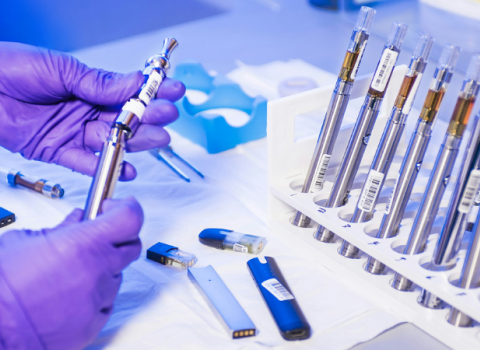
Climate change: biotech’s big challenge.
Biotechnology will play a critical role in building a low-carbon economy, Craig Venter, one of its greatest advocates, told delegates in the opening session. “Biotechnology offers solutions related to food production, sustainable energy and clean water,” said the US genomics expert.
After his triumph in declaring an honourable draw with the public sector in the race to sequence the human genome – an achievement which will underpin biotech’s future contribution to healthcare – Venter has turned his attention to synthetic biology, with the aim of stitching bacterial and other genomes together to generate biofuels and replacements for petrochemicals.
For example, he told the audience, his institute has partnered with a major US oil company to develop biofuels from algae. Researchers at the institute are now hard at work, modifying algal genes to create entities which can produce a higher concentration of fatty acids. Venter feels strongly that this venture is bringing the long-standing promise of algal biofuel, initiated in the 1970s at the US National Renewable Energy Laboratories, one step closer to reality.
Science is not enough
But the development of cellulosic bioethanol illustrates that science alone cannot create a sustainable future, noted Steen Riisgard, CEO of the Danish company Novozymes, a specialist in developing and commercialising enzymes for use in industrial processes. “There are other things that have to fall into place,” Riisgard said, pointing to the need for greater coherence within the EU’s biofuel legislation.
Despite the push to promote industrial applications, biotechnology’s contribution to healthcare remains the major preoccupation for European policy. One of the largest European projects, the Innovative Medicines Initiative (IMI), was the subject of a session in which Ferran Sanz, a biostatistics professor at University Pompeu Fabra in Barcelona, described eTOX, an IMI project that focuses on the evaluation of drug toxicity through computer models. The eTOX collaboration brings together 23 different EU public and private organisations, of which 5 come from Spain, but is the only IMI project led by Spain. Sanz is himself a director of eTOX.
Discussing the standing of the Spanish biotech sector, Sanz told Science|Business that many Spanish biotech companies have traditionally limited their search for funding and customers to the national market. “The current economic climate, which is particularly serious in Spain, could be an opportunity to transform a problem into a solution,” he believes. “Now is the right time for small biotech companies to look out for opportunities in Europe,” he said.
For now, there remains a mismatch between the quality of Spain’s academic research base and the size of its commercial biotech sector. Sanz emphasised that biotechnology is quite developed in Spain, particularly in the academic sector, as demonstrated by “the high number of international projects that Spain participates in”.
Similarly, Javier Urzay, from Farmaindustria, the Spanish Association of Pharmaceutical Companies, was also positive about the country’s increasing collaboration in international projects. It is leading only one project. But, added Urzay, “Sixty per cent of the projects in the IMI have Spanish participation.”
The conference also considered the emergence of so-called P4, or Predictive, Personalised, Preventive, Participatory healthcare. Another famous US scientist, Leroy Hood, president and co-founder of the Seattle Systems Biology Institute, told delegates P4 “will reduce costs by improving diagnosis”, promising that the approach “will revolutionise the world of health care in less than 10 years.” One question he posed was whether or not the current health care industry will be able to adapt to these new trends, or if a new type of industry will have to emerge.
The government of Luxembourg is obviously convinced having put $200 million into a partnership with Hood to a systems biology institute in Luxembourg to mirror the institute in Seattle. According to Hood, such global international partnerships are essential to the future of health biotechnology. “The resources to take on the challenge of world-wide health care will come from integrating efforts in strategic partnerships,” he said.
But as ever, European biotechnology has many obstacles to overcome before global success can be achieved. “Europe must work to build a knowledge-based bio-economy,” Mauve Rute, the European Commission’s spokesperson for small and medium enterprises, told the conference. Yet Rute said a new policy framework is needed to encourage the biotech industry, and the European Commission is now working to address policy deficiencies.
Another challenge confronting Europe’s biotech sector is to ensure the current economic climate does not have a negative impact on its long-term future.
The conference itself has been hit by the crisis, as evidenced by a slight fall in the number of attendees against previous years, “Particularly in the delegates from the industry,” Francesc Gòdia, the chairman of the organising committee, told Science|Business.
Gòdia emphasised that to make biotechnology a success in this current economic climate “It’s also important to gain public support, which means we have to help society understand that biotech is a not a problem, but a solution.”





 A unique international forum for public research organisations and companies to connect their external engagement with strategic interests around their R&D system.
A unique international forum for public research organisations and companies to connect their external engagement with strategic interests around their R&D system.